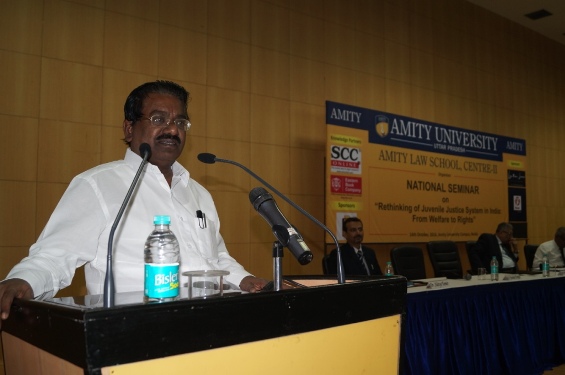14 Oct 2016|Noida | I2 Moot Court
Law School, Centre- II organizes a National Seminar on "Rethinking of Juvenile Justice System in India: From Welfare to Rights”

Toapprise the budding legal professionals with contemporary developments in JuvenileCriminal Justice System, Amity Law School, Centre- II organized a NationalSeminar on "Rethinking of Juvenile Justice System in India: From Welfareto Rights” at Amity University, Sector 125 Campus Noida.
The aim of the seminar was tounderstand the mental, physical and emotional trauma that transforms lives ofJuvenile offenders and their families and to deliberate upon effective JuvenileInterventions by relevant authorities such as Courts, Community Partnerships,and Therapeutics.
The Seminar witnessed thepresence of eminent personalities including Dr. Jitendra Nagpal, Program Director,Expressions India; Dr. Alok Mishra, Hon’ble Chairperson, Brain BehaviourResearch Foundation of India; Dr. Shubhra Sanyal, Retd. Professor, CriminalPsychologist, National Institute of Criminology and Forensic Science; Shri TKSElagovan, Hon’ble Member of Parliament, Rajya Sabha; Hon’ble Justice Mukundakam Sharma, Former Judge, SupremeCourt of India and Ms. Stuti Kakkar, Hon’ble Chairperson, National Commissionfor Protection of Child Rights.
Welcoming the distinguishedgathering, Dr. D K Bandopadhyay, ActingChairman, Amity Law Schools said that every human being including ajuvenile has been guaranteed few rights by the Constitution of India. Heremarked that there are times when human beings are deprived of their rightsand many times when they misuse the rights. It becomes imperative, he stressed,for Judiciary to step in and resolve the issues in both the instances. Heaverred that Juvenile Criminal Justice System in the country has recentlyincorporated changes and the current Seminar would help in discussing anddeliberating upon the same.
Addressing the gathering, Dr. Jitendra Nagpal said that thesociety is still trying to figure out the difference between a child andjuvenile as it is very essential for child welfare, their rights and alsoholistic development. He emphasized “there are laws to take care of children, theirmental health and feed them so why there is a paradox for a law student to cometo terms that we need to have their protection laws as well.” He shared that inIndia, every year 27 lakhs children die due to lack of nutrition and asreported 53% of children are sexually abused. Dr. Nagpal stressed that interpretation forlaw students has to expand its horizons so that there are inter sectoriallinkages. He suggested that the Ministry of Law should collaborate with HRDMinistry, Development Ministry and NCPCR to formulate better laws.
Expressing his views on Juvenilecrimes, Shri TKS Elagovan said that at present the problem around JuvenileAct is to amend the age of juveniles for crimes. He stressed that thedevelopment of mind and body is not synchronized so reducing the age from18years to 16 years in not the solution. He averred that an individual canindependently built his career and wealth but not his character which is the combinedresult of influence of family, society, peers etc. Shri Elagovan pointed thatthere is a lack of leadership in building the character of the youth in thiscountry. Empathy is required towards other people which will help in reducingthe crimes in country.
Speaking on the occasion, Ms. Stuti Kakkar said that 39% of ourpopulation are children wherein for children aged 0-12years are under parentalcare, they have right to be nourished, educated, protected, loved, right to be bornincase of girl child. While when they are proceeding towards adolescence,children go through various mental and physical changes then different kinds ofrights are there and Juvenile Justice System is very important. She mentionedthat there are children all around us who are working, begging or abused butpeople turn blind eye towards the. It is our collective responsibility as asociety to look into the needs of such children and protect them. She apprisedthat there are UN conventions for rights of a child so that different lawscould be made according to needs and age group of children. Ms. Kakkar called upon the budding legalprofessional to build an inclusive society by formulating equal laws.
Dr.Shubhra Sanyal saidthat many juveniles have committed crime due to influence of drugs or inreaction to their abusive childhood, dropouts etc. She further shared herexperiences as consultant to juvenile criminals and how she helped in changing their criminal acts.